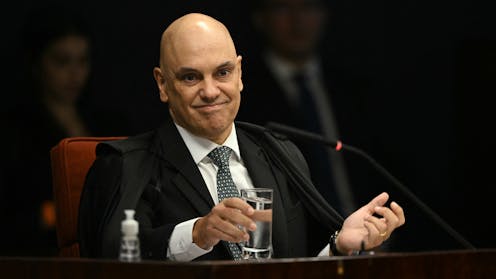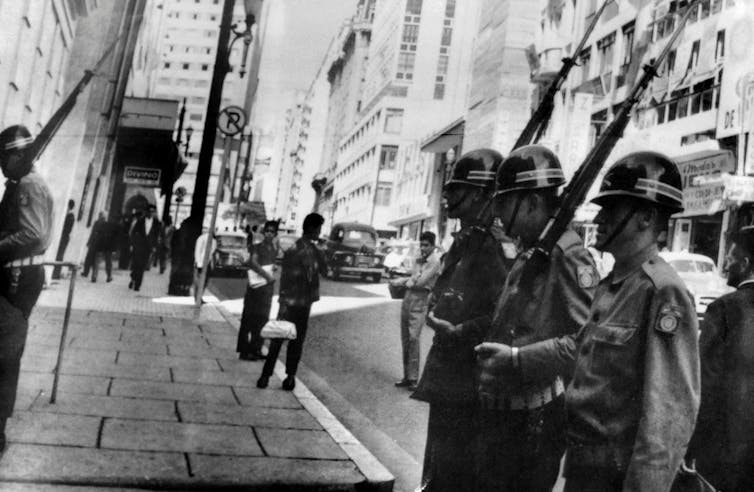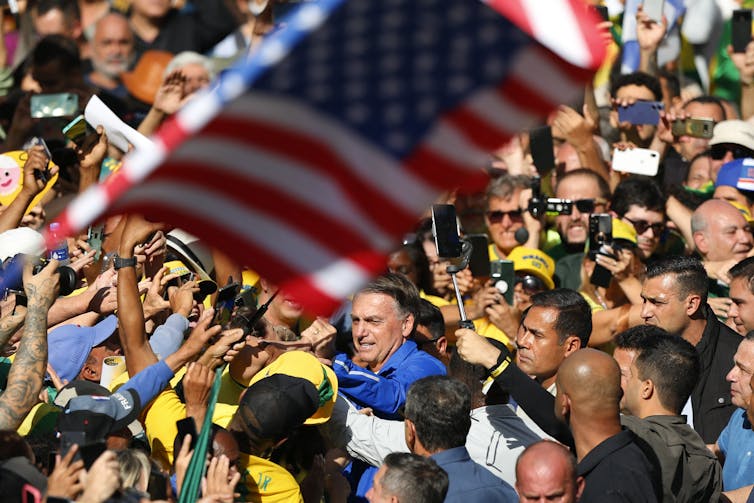
Brazil has a long and tragic history of military intervention in politics. Too often, the country’s armed forces have made themselves arbiters of what the country’s government could or could not do.
In many cases, the military has intervened to block policies it sees as threatening the status quo in one of the world’s most unequal societies. In other instances, it has taken the form of a direct coup d'etat, resulting in the installation of rule by military dictatorship.
As a scholar of Brazilian history and politics who grew up and lived in different parts of the country, I see growing reasons for hope despite the many challenges Brazil still faces. Its democratic institutions, though still relatively young, have shown a significant degree of resilience.
And the latest attempt to encourage military intervention in Brazil’s democracy may, conversely, have encouraged such resilience. On Jan. 8, 2023, former president Jair Bolsonaro, his close military and civilian associates and throngs of his supporters attempted to carry out a coup. It failed, and since then, those responsible have been held accountable through a series of investigations and prosecutions.
It culminated on Sept. 11, 2025, when the country’s highest court found Bolsonaro and his co-conspirators guilty of crimes against the country’s democratic institutions and rule of law.
Hatching a foiled plot
The foiled coup plot was hatched after Bolsonaro, a former military officer, lost his bid to be reelected in October 2022. He refused to accept defeat and urged his supporters to take to the streets and demand that the military block the return of Luiz Inácio Lula da Silva to power.
Lula, as he is commonly known, had already served two terms as Brazil’s president, from 2003 to 2011. And when Lula won the 2022 presidential race, Bolsonaro and his associates sought to prevent his return to power by plotting to poison him, kill the man who is now Brazil’s vice president, Geraldo Alckmin, and attack Supreme Court Justice Alexandre de Moraes, according to Brazilian police authorities – all prior to Jan. 8, 2023. Then, they tried to oust Lula instead just a week after his inauguration on Jan. 1.
During the failed coup attempt, thousands of Bolsonaro’s supporters looted the Presidential Palace, Congress and Supreme Court buildings in Brasília, the nation’s capital. Their goal was to prod the armed forces to remove Lula from power – but that didn’t happen. Only some key military leaders were on board with the plan, including those now sentenced by the Supreme Court. Because there was no consensus, the coup was foiled.
In the immediate aftermath, it was unclear whether the masterminds of that mayhem would be brought to justice, even as more than 1,600 looters were tried and sentenced.
Building a robust case
And this is where de Moraes played a major role.
De Moraes worked meticulously for over two years to build a robust case against Bolsonaro and five high-ranking military officers, who were convicted of crimes against the country’s democratic rule. All of them were sentenced to more than 20 years in prison.
Bolsonaro, who has long-term health problems that began when he was stabbed in the abdomen during his 2018 presidential campaign, could end up doing time in his own house or a health care facility instead of a prison. He could also appeal the verdict and his sentence.
Nonetheless, the verdict is historic.
For the first time, the perpetrators of a serious effort to subvert democracy in Brazil have been tried and convicted, rather than given amnesty and let off the hook.
These convictions also mark the first time that any military leaders who participated in a coup attempt have been punished.

Using economic retribution
President Donald Trump, who has forged close ties with Bolsonaro, has objected to the former president’s prosecution. Even before the verdict came out, Trump sought to punish Brazil for what he and Secretary of State Marco Rubio have called “a witch hunt” by imposing 50% tariffs on Brazilian exports to the U.S – up from an earlier 10% rate.
Through his own statements, Trump has made it clear that he was using economic retribution to express his disapproval of what, in effect, is the outcome of an independent judicial system in a sovereign nation that the U.S. has historically considered to be an ally.
Lula argued in a New York Times op-ed that Trump’s tariffs are “illogical” and “political,” partly because the U.S. has posted a trade surplus with Brazil for many years.
What’s more, the Trump administration has generally cast its policy of tariff increases as a strategy to reduce the U.S. trade deficit.
In addition, U.S. consumers could be hurt by higher prices for key imports from Brazil, such as coffee, which is now near record-high levels.
Lula, meanwhile, seems ready to look for alternative markets.

Trial’s outcome could reverberate for years
I believe that Bolsonaro’s trial will help shape the course of U.S.-Brazilian relations and influence Brazil’s domestic politics for years to come – beginning with the 2026 presidential elections. It could prove a historic opportunity to consolidate democracy, or begin a new phase of democratic erosion.
Given Brazil’s fraught political history, the courageous steps Brazilian leaders have taken to strengthen its democratic institutions and the rule of law are, in my view, not minor feats – particularly at a time when democracy seems to be retreating around the world.
Rafael R. Ioris does not work for, consult, own shares in or receive funding from any company or organization that would benefit from this article, and has disclosed no relevant affiliations beyond their academic appointment.
This article was originally published on The Conversation. Read the original article.







